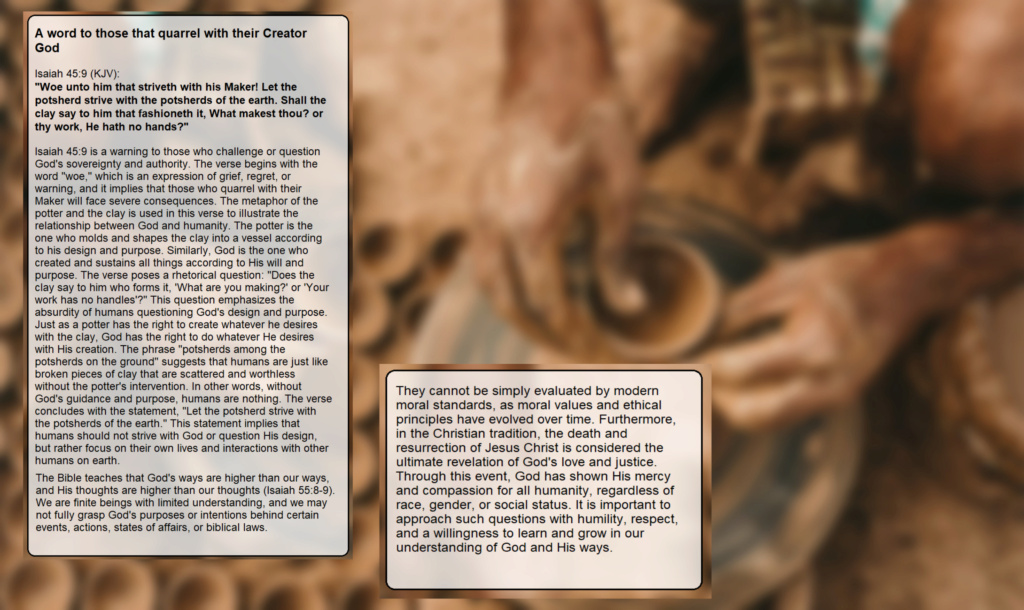A word to those that quarrel with their Creator God
Isaiah 45:9 (KJV):
"Woe unto him that striveth with his Maker! Let the potsherd strive with the potsherds of the earth. Shall the clay say to him that fashioneth it, What makest thou? or thy work, He hath no hands?"
Isaiah 45:9 is a warning to those who challenge or question God's sovereignty and authority. The verse begins with the word "woe," which is an expression of grief, regret, or warning, and it implies that those who quarrel with their Maker will face severe consequences. The metaphor of the potter and the clay is used in this verse to illustrate the relationship between God and humanity. The potter is the one who molds and shapes the clay into a vessel according to his design and purpose. Similarly, God is the one who created and sustains all things according to His will and purpose. The verse poses a rhetorical question: "Does the clay say to him who forms it, 'What are you making?' or 'Your work has no handles'?" This question emphasizes the absurdity of humans questioning God's design and purpose. Just as a potter has the right to create whatever he desires with the clay, God has the right to do whatever He desires with His creation. The phrase "potsherds among the potsherds on the ground" suggests that humans are just like broken pieces of clay that are scattered and worthless without the potter's intervention. In other words, without God's guidance and purpose, humans are nothing. The verse concludes with the statement, "Let the potsherd strive with the potsherds of the earth." This statement implies that humans should not strive with God or question His design, but rather focus on their own lives and interactions with other humans on earth.
The Bible teaches that God's ways are higher than our ways, and His thoughts are higher than our thoughts (Isaiah 55:8-9). We are finite beings with limited understanding, and we may not fully grasp God's purposes or intentions behind certain events, actions, states of affairs, or biblical laws. In the specific case of genocide or slavery in the Old Testament, it is important to remember that these actions occurred in a particular cultural and historical context. They cannot be simply evaluated by modern moral standards, as moral values and ethical principles have evolved over time. Furthermore, in the Christian tradition, the death and resurrection of Jesus Christ is considered the ultimate revelation of God's love and justice. Through this event, God has shown His mercy and compassion for all humanity, regardless of race, gender, or social status. It is important to approach such questions with humility, respect, and a willingness to learn and grow in our understanding of God and His ways.

Isaiah 45:9 (KJV):
"Woe unto him that striveth with his Maker! Let the potsherd strive with the potsherds of the earth. Shall the clay say to him that fashioneth it, What makest thou? or thy work, He hath no hands?"
Isaiah 45:9 is a warning to those who challenge or question God's sovereignty and authority. The verse begins with the word "woe," which is an expression of grief, regret, or warning, and it implies that those who quarrel with their Maker will face severe consequences. The metaphor of the potter and the clay is used in this verse to illustrate the relationship between God and humanity. The potter is the one who molds and shapes the clay into a vessel according to his design and purpose. Similarly, God is the one who created and sustains all things according to His will and purpose. The verse poses a rhetorical question: "Does the clay say to him who forms it, 'What are you making?' or 'Your work has no handles'?" This question emphasizes the absurdity of humans questioning God's design and purpose. Just as a potter has the right to create whatever he desires with the clay, God has the right to do whatever He desires with His creation. The phrase "potsherds among the potsherds on the ground" suggests that humans are just like broken pieces of clay that are scattered and worthless without the potter's intervention. In other words, without God's guidance and purpose, humans are nothing. The verse concludes with the statement, "Let the potsherd strive with the potsherds of the earth." This statement implies that humans should not strive with God or question His design, but rather focus on their own lives and interactions with other humans on earth.
The Bible teaches that God's ways are higher than our ways, and His thoughts are higher than our thoughts (Isaiah 55:8-9). We are finite beings with limited understanding, and we may not fully grasp God's purposes or intentions behind certain events, actions, states of affairs, or biblical laws. In the specific case of genocide or slavery in the Old Testament, it is important to remember that these actions occurred in a particular cultural and historical context. They cannot be simply evaluated by modern moral standards, as moral values and ethical principles have evolved over time. Furthermore, in the Christian tradition, the death and resurrection of Jesus Christ is considered the ultimate revelation of God's love and justice. Through this event, God has shown His mercy and compassion for all humanity, regardless of race, gender, or social status. It is important to approach such questions with humility, respect, and a willingness to learn and grow in our understanding of God and His ways.


